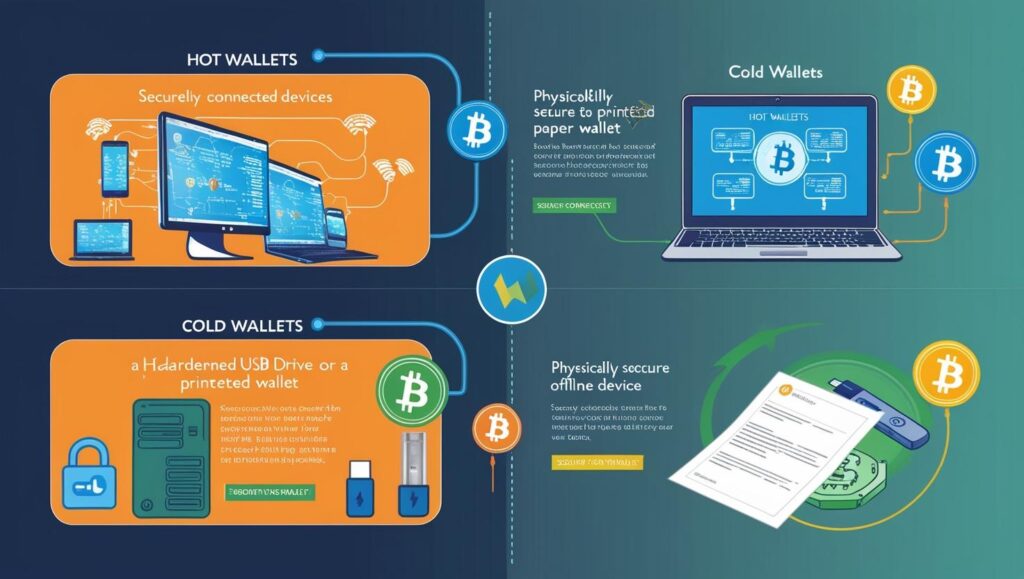Hot Wallets

Hot wallets are digital wallets that are connected to the internet. They are convenient for frequent transactions and easy access to your cryptocurrency. Here are some key points about hot wallets:
- Accessibility: Hot wallets are always online, making them ideal for daily transactions and trading.
- Examples: Popular hot wallets include Coinbase Wallet, MetaMask, and Trust Wallet2.
- Security: While convenient, hot wallets are more vulnerable to hacking and online threats due to their constant internet connection.
- Usage: Best suited for users who need quick access to their crypto assets and are comfortable with the associated security risks.
Cold Wallets
Cold wallets, also known as cold storage, are offline wallets that provide a higher level of security. They are ideal for long-term storage of cryptocurrency. Here are some key points about cold wallets:
- Security: Cold wallets are not connected to the internet, making them highly secure against hacking and online threats.
- Examples: Popular cold wallets include hardware wallets like Ledger Nano S, Trezor, and paper wallets2.
- Usage: Best suited for users who want to store large amounts of cryptocurrency securely for a long period.
- Accessibility: Cold wallets require more effort to access and use, as they need to be connected to a device to perform transactions.
Choosing Between Hot and Cold Wallets
The choice between hot and cold wallets depends on your needs and preferences:
- Hot Wallets: Choose a hot wallet if you need frequent access to your cryptocurrency for trading or daily transactions.
- Cold Wallets: Choose a cold wallet if you prioritize security and plan to hold your cryptocurrency for a long time without frequent transactions.
Best Practices for Using Crypto Wallets
Regardless of the type of wallet you choose, here are some best practices to keep your cryptocurrency safe:
- Use Strong Passwords: Ensure your wallet is protected with a strong, unique password.
- Enable Two-Factor Authentication (2FA): Add an extra layer of security by enabling 2FA.
- Backup Your Wallet: Regularly backup your wallet and store the backup in a secure location.
Keep Software Updated: Ensure your wallet software is always up to date to protect against vulnerabilities.

What To Know About Cryptocurrency
Paying With Cryptocurrency
Cryptocurrency is a type of digital currency that exists only electronically. It is decentralized and uses cryptographic techniques to secure transactions. Popular cryptocurrencies include Bitcoin, Ethereum, and Dogecoin. People use cryptocurrency for quick payments, to avoid transaction fees, or as an investment.
You can use cryptocurrency to pay for goods and services at merchants that accept it. For example, PayPal allows users to pay with cryptocurrencies like Bitcoin, XRP, Ethereum, Bitcoin Cash, and Litecoin. When you use cryptocurrency to pay, it is converted to fiat currency during the checkout process. Other platforms like BitPay also offer services to pay bills and make purchases with cryptocurrency3.
How To Avoid Cryptocurrency Scams
Cryptocurrency scams are becoming increasingly common. Here are some tips to avoid them:
- Be Skeptical of Unsolicited Offers: Scammers often pose as trusted sources to lure you into fraudulent investments.
- Verify Websites and Emails: Double-check URLs and email addresses to ensure they are legitimate.
- Secure Your Wallet: Use multi-factor authentication and never share your private key or seed phrase.
- Avoid Up-Front Fees: Be wary of any offer that requires an up-front fee, especially if it must be paid in cryptocurrency.
How To Report Cryptocurrency Scams
If you fall victim to a cryptocurrency scam, you can report it to the Internet Crime Complaint Center (IC3), which is run by the FBI. They collect complaints about cyber-enabled crimes and use the information to investigate and track trends7. You can file a complaint on their website.